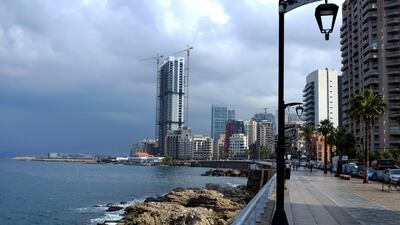Lebanon's economy could teeter "on a cliff edge" if the country's political reforms are delayed for more than a few months, according to a report by the Institute of International Finance.
The country's economy is forecast to grow 1.3 per cent in 2018, down from an estimated 1.8 per cent in 2017, due to political deadlock over forming a cabinet, the IIF said in the report. It called for urgent reforms to reduce Lebanon's growing fiscal deficit.
"Risks to the outlook remain significant," the Washington-based research centre said. "Continued political bickering over the distribution of ministerial posts could delay further the formation of a new unity cabinet and derail policy implementation."
Lebanon's internal political paralysis and a seven-year war in neighbouring Syria are hindering economic development. A caretaker government is currently in place until designated prime minister Saad Hariri forms a new unity cabinet but political squabbles are delaying economic reforms.
On Friday, Mr Hariri expressed hope that the “disagreements we see in the government formation will disappear". His comments came at a dinner held in Lebanon in honour of the UAE Ambassador to the country Hamad Al Shamsi. “My belief is that all political parties know the challenges we face, whether on the regional, security, economic or environmental levels," he said. "We must be a bit humble and think more about the country because the economic situation needs attention, and we have a historic opportunity through the Cedre conference to advance the country”.
In April, at the Cedre conference in Paris, international donors pledged more than $11 billion in loans and grants to help improve Lebanon's ailing infrastructure. However, in the absence of a functioning new government, authorities are unable to launch reforms and sign off on the package.
In 2018, the country's fiscal deficit is expected to widen to 9.7 per cent of the gross domestic product as the public-sector wage bill increases, according to the IIF report. As a result, the public debt-to-GDP ratio is set to increase to 151 per cent from 148 per cent last year.
"Significant fiscal consolidation is urgently needed to support the pegged exchange rate, put public debt on a firm downward trajectory, and help restore investor confidence," the IIF said.
__________
Read more:
Lebanon's lucky streak may be fading in face of mounting economic woes
Lebanon’s business conditions in July deteriorate to near two-year low
IMF hopeful of a new government, economic reforms in Lebanon
__________
The IIF called on authorities to reduce the deficit in a sustainable way by reducing the wage bill, reforming the public pension fund, restructuring the electricity sector, increasing tax compliance, raising fuel taxes and selling non-performing state assets.
"Monetary policy should remain tight to reduce inflationary pressures, support the peg, and ensure adequate inflow of non-resident deposits," the report said.
GDP growth, adjusted for inflation, must reach at least 3 per cent to begin reducing public debt. The IIF forecast GDP growth of 2.1 per cent in 2019 compared to 1.3 per cent this year.
Lebanon needs to improve its business environment by enhancing governance to help reduce corruption, strengthen business confidence and boost investment, the IIF said. The major hurdles to doing business in Lebanon include inadequate infrastructure, institutional corruption and government bureaucracy.
Addressing infrastructure bottlenecks - through major projects in energy, transport, wastewater and telecoms - could potentially raise GDP growth to 5 per cent by 2023, the report said.
Lebanon's economy needs to grow by at least 4 per cent - compared to an average growth of 1.7 per cent over the last seven years - to absorb the new workers entering the job market, reduce unemployment and decrease government debt-to-GDP ratio.
"Further political bickering, long delays in fiscal adjustment, and failure to address infrastructure bottleneck would undermine private investment and macro stability. Such a scenario could put the economy on a cliff edge," the IIF concluded.


